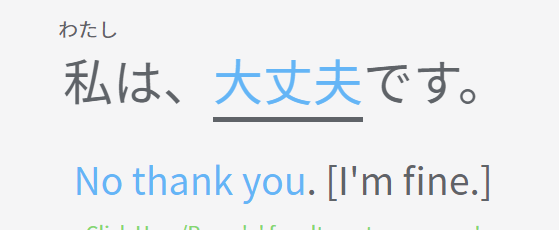set phrase: ‘no thank you’ ・ quite・a lot
Structure
- けっこう + です
- けっこう + Adj

This is another grammar point where you should probably also mention the 漢字 spelling:
結構
Added 
Why is the kanji for daijoubu allowed but not the hiragana?

Sorry about that. It looks like the kanji answer was accidentally added to alternative answers making it appear when you cycle through the hints. We still do not have a way to answer with kanji set up in the system, but hope to have it available soon.
I have updated the review question to allow the hiragana answer.
Thank you for reporting it!
Cheers 
Just a suggestion, but I think the “quite” and “no thank you” meanings should be separated into different grammar points. Since the SRS memorising system is supposed to help you remember by making you recall things just before you forget them, having two alternative meanings in the same point means that you’re not recalling the other one when you should be, according to how the system works.
Obviously where the meanings are linked or close, you could remember them both together as one grammar point despite the sentence having only one particular wording. For example, all the 他 sentences are about ‘others’, even if the wording sometimes becomes “anything else”, etc. But I think for the two meanings here, there’s no obvious connection.
Edit: On second thoughts, since “quite” is just a word, and not a grammar point, perhaps that could just be taken out of the examples so it’s all about “no thank you”?